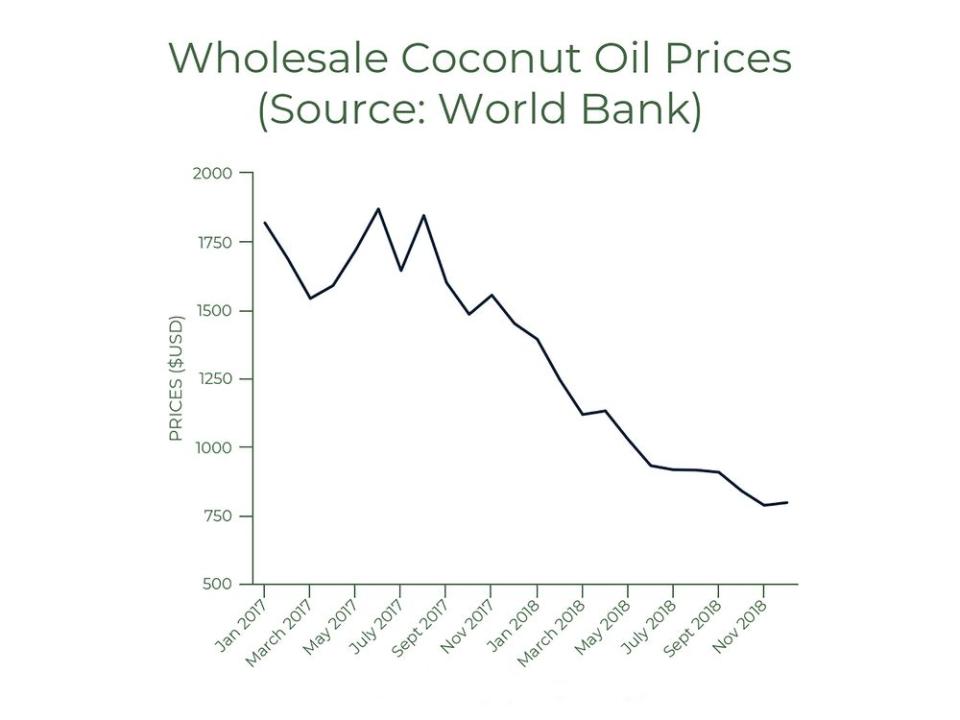Coconut Oil Stocks Drop by Half As Everyone Realizes How Unhealthy It Is
We've said it before and we'll say it again—coconut oil isn't healthy enough to earn the health halo it's been enjoying since the paleo diet started lauding it in 2011. First, the American Heart Association has found that saturated fats (which coconut oil is very high in) play a significant role in cardiovascular disease, and that most veggie-based oils were far superior for our heart health compared to butter or coconut oil. And then a year later, we saw sales slump (though clearly some readers still feel quite strongly about the health benefits of coconut oil).
And so, as even more health experts continue to condemn coconut oil's cardiovascular blowback, it makes sense that wholesale prices have dropped by more than 50 percent as demand nosedived. It doesn't help that alternative vegetable-based oils have also become drastically cheaper, making coconut oil more costly.
The Wall Street Journal reports that the wholesale price of industrial coconut oil averaged a mere $786 per metric ton in November 2018—which is down more than 58 percent compared to a record high of $1,869 in June 2017, according to sales data sourced from the World Bank. Unsurprisingly, imports of coconut oil into the United States have also dropped by 4 percent in between September 2017 and 2018, the Wall Street Journal reports.
Furthermore, data sourced from the United States Department of Agriculture suggests that coconut oil isn't as widely used as it once was. Americans used 437,000 metric tons of coconut oil between 2017 and 2018, whereas 562,000 metric tons were used between 2014 and 2015. The Wall Street Journal notes that industrial use didn't change much over those periods, meaning the drop in usage is likely to be due to smaller individual consumption.

More on cardiovascular health:
Cooking Light's nutrition director, Brierley Horton, has previously explained that concerns over coconut oil have to do with more than just its saturated fat content (which acts as 80 percent of its overall make up). The amount of low-density lipoproteins, also commonly referred to as LDL cholesterol (or as what many health professionals refer to as "bad" cholesterol), in coconut oil has previously been shown to raise overall levels in the body thanks to regular consumption. In addition, the American Heart Association has published guidelines recommending that saturated fat make up less than 10 percent of daily caloric intake.
Horton makes it clear that consuming coconut oil in moderation isn't the issue—in fact, Cooking Light has even published recipes featuring the rich, flavorful ingredient. But home cooks should be aware that heavy consumption could impact cardiovascular health, and that there are better alternatives to regularly cook with: namely, canola oil (here's why).
But home cooks may be abandoning coconut oil in the interest of new alternatives such as avocado oil, according to Dorab Mistry, a vegetable oil analyst at Godrej International. He told the Wall Street Journal that demand for oil "tends to move with whatever has captured the imagination of discerning consumers."
The good news? Lower coconut oil prices have served some companies well, including beauty manufacturers who use the staple to create everything from shampoo to skin care products. And while it's unclear if raw coconut oil has directly seen a price drop in grocery stores, this sales trend could help you adapt coconut oil into your beauty routine—or any of these 10 topical remedies used to boost skin health.

